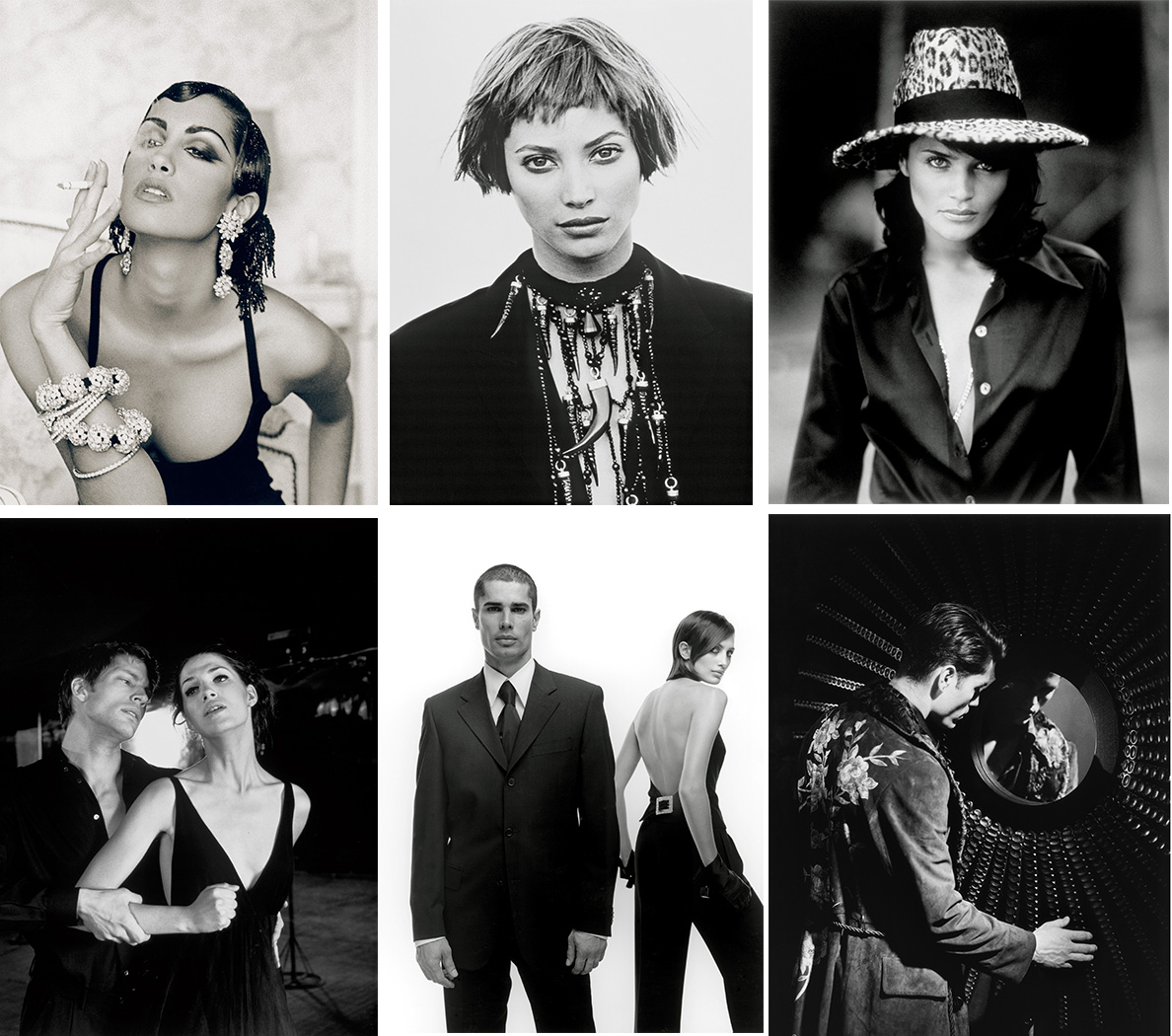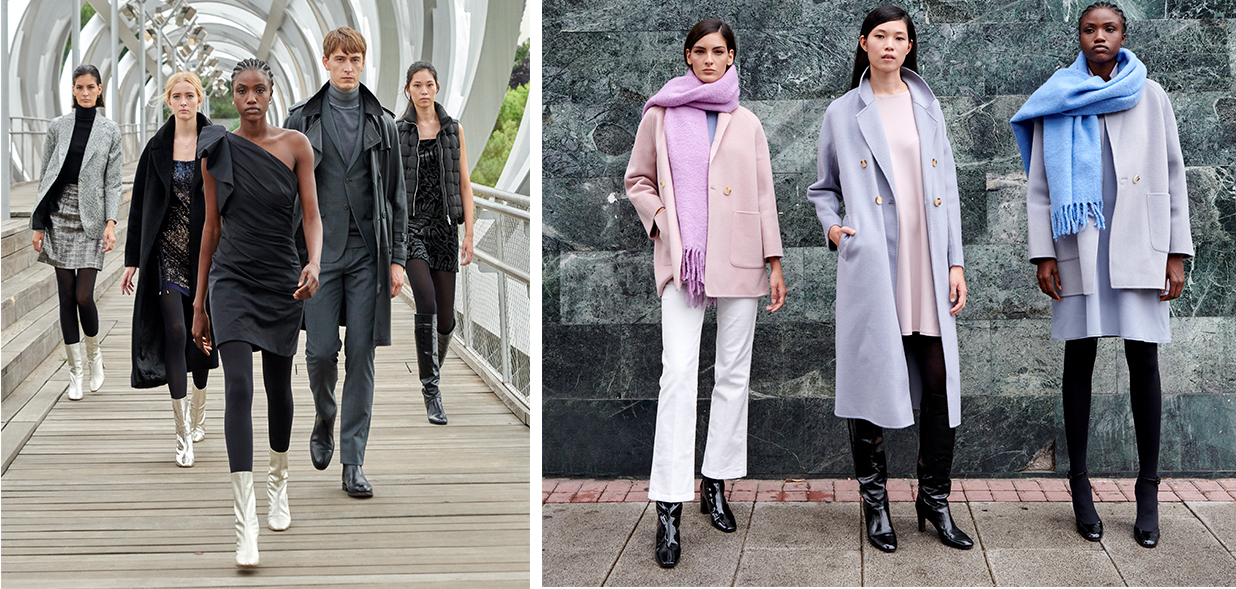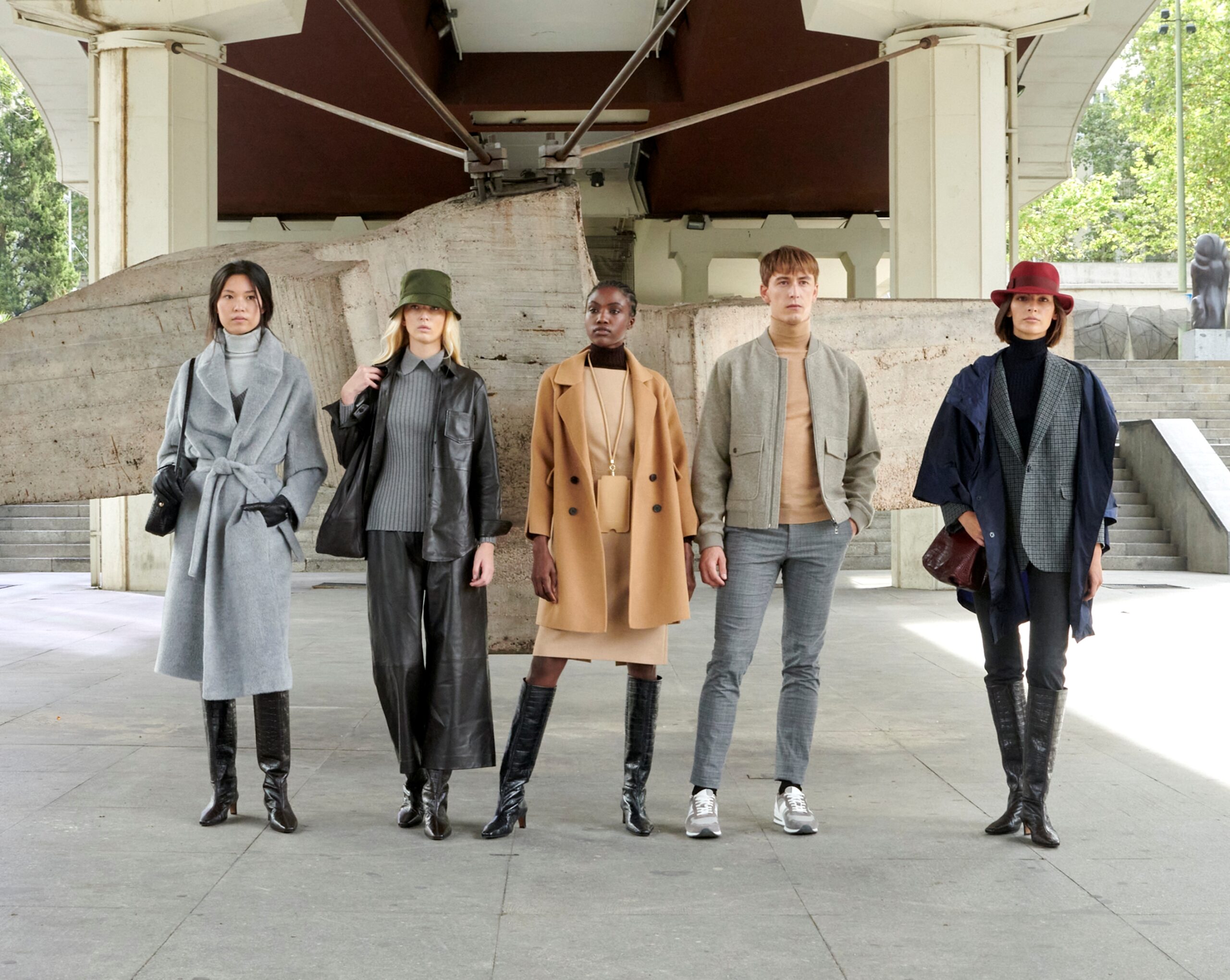About to celebrate 40 years in fashion, Roberto Verino stands as one of the greatest defenders of slow fashion, sustainable fashion and emotional wardrobes in times of urban nomadism.
Roberto Verino is the random and at the same time determined result of a long journey. From Paris, where he learnt his trade and was infected by the iconoclastic rebelliousness of May ’68, to Barcelona and the evening strolls with the master Pertegaz that he still remembers, both marvelling at the unnoticed. From rationalist architecture, his passion for Frank Lloyd Wright, to the eternal countryside, the lands of Gargalo that filter through the fabric in his chromatic universe, and define the colours of his collections.

Campaigns from the 90’s and 2000’s with the tops of the moment. From left to right above: Campaign photographed by Jacques Olivar with top Jasmeen Ghauri and Christy Turlington was photographed by the same photographer. Below from left to right: Laura Sánchez and Cameron photographed by Sara Zorraquino, Nieves Álvarez and Cameron photographed by Javier Salas.
Roberto Verino, beyond the duality between creator and businessman, has multiple visions. In recent years he has become a benchmark for slow fashion: “I defend the simplicity of a design, the quality of a material, a timeless colour, as well as the functionality of long-lasting proposals”. Sustainability is not a label or a fibre;
The most sustainable thing is reasonable consumption, it’s an intelligent and emotional wardrobe,” he tells me in a conversation for Horse.
This September he walked the catwalk in Madrid, at the Museo de Escultura al Aire Libre de La Castellana, with the special support of the MCDM project of the Madrid City Council, accompanied by Dora Casal, the firm’s Executive Director, and Cristina Mariño, its Brand Director. These were capsule collections – he no longer makes them endless – which were paraded fused with the urban landscape. His aim: flexible fashion that is not monolithic and is characterised by a personal symbolism that makes us connect with ourselves.

Roberto Verino presents his Autumn-Winter 2021-22 ‘Nomadism’ collection surrounded by his models. Photographer: Alfredo Arias.
Cristina Mariño, Roberto’s daughter, recalls that she has always been close to her father: “I was born in the company”, she says. She was the most critical of the family, although she greatly admired her father’s ability to create. As a child, she wanted to be a model. I have been preparing her,” Verino tells me, “so that she knows all the ins and outs of the company, from the point of sale to design. Marketing and communication are her strengths”. Today Dora is the executive director, “and I’m still the creator,” she continues, “the one who makes the collections with my usual collaborators: María del Valle -his wife- and Eulogio Ventoso”.
There is an idea of the creator that captures me for its beauty: “I love things that fit in one hand. From a book to an apple, a soap, a ring”, and he loves them with all five senses, but without loudspeakers. “Humility is a way of understanding life”, she says.
And what does this emotional wardrobe look like?
When we talk about emotional wardrobes we mean that, when we open their doors, we feel that they are telling us things. Each garment is like a diary where you write down what has happened to you, what you have renewed in your life. Sometimes I meet people in the street who tell me “you don’t know how grateful I am to have married a dress of yours that I was very happy with”. These are spontaneous connections that favour an almost magical connection, and that makes me eager to connect with more people.

Collection Roberto autumn 2021-winter 2022 Verino oi 2021-22 photographer Pablo Paniagua
Is fashion still understood as something superficial?
Consumers who feel cared for feel attached. Loyalty consists of giving them proof that I think about them, to provide them with solutions to their needs and that they can be happy with fashion. There is a big difference between dressing to cover up and dressing to enjoy… and that is where I wanted customers to see the advantage of improving their self-esteem, I want to believe that we should all know them, take care of them, but also accept them. And enjoy.
What does it have to do with Amancio Ortega?
We have some things in common: we go to work every day, we keep the same friends we had when we were kids, we eat with the people from the factory…

Roberto Verino Collection-oi-2021-22 photographer Pablo Paniagua
In its mission statement it stands for sustainability, craftsmanship and rational production…
We have been insisting for a long time, but to get the message across it needs to be emphatic and reiterated. It has been demonstrated that fashion, the sustainability trend is very powerful, but traditional companies believe that it is a label, a fibre. They don’t understand that the most sustainable thing is reasonable consumption, and that is a smart wardrobe. That makes you more attached to your consumer. Thanks to my loyal customers I have been able to endure the most difficult periods of the crisis. At the beginning I was told that producing less was against logic, but I stuck to my guns: what you have to defend is the simplicity of a design, the quality of a material, the colour that becomes timeless and the functionality of the proposals. It has to be long-lasting.
So start a conversation with your customers.
Yes, the consumer feels cared for, you show them that you are sensible and that you are thinking about them, to give them solutions to their needs and that they can be happy with fashion. Dress to cover up or dress to enjoy? That’s where I want customers to see the advantage of improving their self-esteem, AND enjoyment. When you dress someone so that the important thing is the person, not an image, you are individually getting a group that is loyal to you because their personality is reinforced. When the product has become old, it is difficult for them to get rid of it. It has become part of your emotions… through this ethereal link, I make it happy.

Collection Roberto Verino-oi-2021-22 photographer Pablo Paniagua
You are horrified by trends, are you against fashion-disguise?
There are people who need to signify themselves in an outlandish way and go as drag queens, they exaggerate aspects that are not conventional… I hate people who dress up following trends even if there are things that don’t suit them, that don’t suit them. You can see that they play roles that don’t correspond to them… and that shows that it’s not authentic. There are people who need to do that because they are not sure of themselves, and I am very sad about that….
Are you against the use of fur?
I use materials that are used in industrial slaughterhouses and that fulfil a function. I don’t like hair very much… There’s a certain papanatism on this subject, because some people defend artificial fur, but this is more polluting, because it’s made from petroleum derivatives. Now, there are people who are horrified by the pollution of the planet, and then travel in their private jet.
With his latest collection, Nomadismo, Roberto Verino moves away from ornamentation, giving the garment the importance of being itself. Like the women and men he dresses. We celebrate his gift for making the difficult simple, and for imbuing the craft of fashion with nobility.



